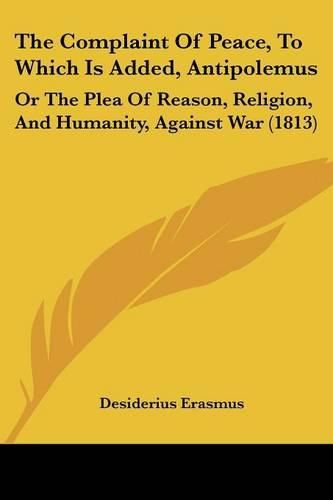Readings Newsletter
Become a Readings Member to make your shopping experience even easier.
Sign in or sign up for free!
You’re not far away from qualifying for FREE standard shipping within Australia
You’ve qualified for FREE standard shipping within Australia
The cart is loading…






The Complaint of Peace is a book written by the famous Renaissance scholar and philosopher, Erasmus of Rotterdam. The book is a powerful critique of war and its devastating effects on humanity. In it, Erasmus presents a compelling argument for the need for peace and the avoidance of war. He argues that war is not only destructive but also irrational and immoral.The book is divided into two parts. The first part, The Complaint of Peace, is a lamentation by Peace herself about the state of the world and the prevalence of war. She argues that war is a result of human greed, pride, and ambition, and that it causes untold suffering and destruction. Peace also argues that war is not a solution to any problem and that it only leads to more violence and conflict.The second part of the book, Antipolemus: Or the Plea of Reason, Religion, and Humanity, Against War, is a more detailed and systematic argument against war. Erasmus argues that war is not only contrary to reason and religion but also to humanity itself. He provides numerous examples from history and literature to support his argument, and he also critiques the arguments made by those who defend war.Overall, The Complaint of Peace is a powerful and thought-provoking book that challenges the reader to think deeply about the nature of war and the need for peace. It is a timeless work that remains relevant today, as we continue to grapple with the devastating effects of war on our world.This scarce antiquarian book is a facsimile reprint of the old original and may contain some imperfections such as library marks and notations. Because we believe this work is culturally important, we have made it available as part of our commitment for protecting, preserving, and promoting the world's literature in affordable, high quality, modern editions, that are true to their original work.
$9.00 standard shipping within Australia
FREE standard shipping within Australia for orders over $100.00
Express & International shipping calculated at checkout
The Complaint of Peace is a book written by the famous Renaissance scholar and philosopher, Erasmus of Rotterdam. The book is a powerful critique of war and its devastating effects on humanity. In it, Erasmus presents a compelling argument for the need for peace and the avoidance of war. He argues that war is not only destructive but also irrational and immoral.The book is divided into two parts. The first part, The Complaint of Peace, is a lamentation by Peace herself about the state of the world and the prevalence of war. She argues that war is a result of human greed, pride, and ambition, and that it causes untold suffering and destruction. Peace also argues that war is not a solution to any problem and that it only leads to more violence and conflict.The second part of the book, Antipolemus: Or the Plea of Reason, Religion, and Humanity, Against War, is a more detailed and systematic argument against war. Erasmus argues that war is not only contrary to reason and religion but also to humanity itself. He provides numerous examples from history and literature to support his argument, and he also critiques the arguments made by those who defend war.Overall, The Complaint of Peace is a powerful and thought-provoking book that challenges the reader to think deeply about the nature of war and the need for peace. It is a timeless work that remains relevant today, as we continue to grapple with the devastating effects of war on our world.This scarce antiquarian book is a facsimile reprint of the old original and may contain some imperfections such as library marks and notations. Because we believe this work is culturally important, we have made it available as part of our commitment for protecting, preserving, and promoting the world's literature in affordable, high quality, modern editions, that are true to their original work.